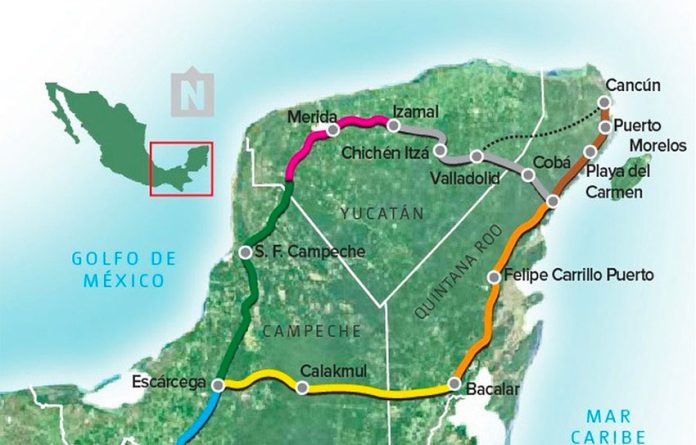A judge has granted a definitive suspension order against the Maya Train project to a group of Maya and Ch’ol people in Campeche but it only applies to one community in the municipality of Calakmul.
Campeche-based Judge Grissel Rodríguez Febles ruled on Wednesday that the National Tourism Promotion Fund (Fonatur), which is managing construction of the US $7-billion Yucatán Peninsula railroad, cannot carry out any new work within the limits of the community of Xpujil.
The decision came five days after a court in Campeche upheld a provisional suspension order granted to the Maya and Ch’ol people that prevented Fonatur from commencing new construction work anywhere in the five states – Quintana Roo, Yucatán, Campeche, Tabasco and Chiapas – through which the railroad will run.
The indigenous people applied for an injunction against the Maya Train on the grounds that the government consultation process, held prior to a December vote on the project that found over 92% support, was not conducted in accordance with their rights.
Their view was supported by the Mexico office of the United Nations High Commissioner for Human Rights, which found that the consultation failed to meet all international human rights standards.
After Wednesday’s ruling, Fonatur noted in a statement that the definitive suspension order does not prevent it from calling for tenders or carrying out work on more than 99% of the 1,500-kilometer project.
The federal agency added that it will continue dialogue with the 19 people who filed the injunction against the project “with the aim of safeguarding the rights of all residents” in Calakmul. Fonatur also said that it was confident that there is sufficient evidence to have the suspension order overturned.
However, if the prediction of a lawyer who advised the people that filed the legal action comes true, Fonatur will face many other legal battles to proceed with the railroad, which is scheduled to begin operations in 2023. Elisa Cruz Rueda said in January that it is likely that other communities in the five southeastern states through which the rail project is slated to run will also be granted injunctions.
Meanwhile, Fonatur chief Rogelio Jiménez Pons told the newspaper Milenio that the project will not include a section of track between Valladolid, Yucatán, and Tulum, Quintana Roo, as announced last June.
Fonatur said in June that the railroad would not directly link Valladolid to Cancún and that there would instead be a line between the former city and Tulum, where travelers would be able to take another line north to Cancún. The agency said at the time that the route change would knock 5.5 billion pesos (US $278 million) off the total cost of the project and 55 kilometers off its length.
However, Jiménez said that the change will not go ahead because of the large number of archaeological sites around Cobá, Quintana Roo, and problems with the subsoil in the area.
“We’re going to make a change, we have to return to the original route from Valladolid to Cancún,” he said, explaining that the decision was taken a few days ago.
Jiménez said that Fonatur will look for savings in other areas of the project to ensure that it doesn’t exceed the planned budget of 139 billion pesos.
Source: Milenio (sp)
